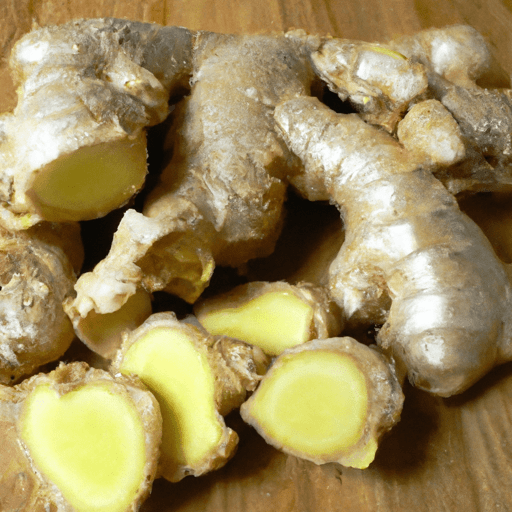The Wonderful World of Ginger Ale
Ginger ale is a delicious and refreshing carbonated beverage that has been enjoyed by people around the world for centuries. With its unique blend of flavors and refreshing taste, ginger ale is a popular choice for those seeking a thirst-quenching drink on a hot summer day. But did you know that ginger ale is not just a drink? It also has a significant role in the culinary world, packed with its distinctive taste and health benefits.
The Flavorful Journey: Taste and Aroma
Ginger ale is beloved for its distinct spicy and zesty flavor, which comes from its key ingredient - ginger. The combination of the pungent, warming notes of ginger with a hint of sweetness creates a harmonious taste that tingles your taste buds. The carbonation adds a delightful effervescence, giving ginger ale its signature fizz and lightness. With its invigorating aroma and vibrant taste, ginger ale is a delightful treat for your senses.
Versatile Culinary Uses
Apart from being a refreshing beverage, ginger ale can also be used in a variety of culinary creations. Its unique flavor profile lends itself well to both sweet and savory dishes. In the realm of cooking, ginger ale can be used as a marinade for meats, such as chicken or pork, infusing them with a hint of ginger and sweetness. It can also be added to stir-fries, glazes, and sauces, heightening the overall flavor profile. In baking, ginger ale can be utilized as a leavening agent or as a substitute for other liquids in recipes to infuse a lovely ginger undertone.
A Nutritional Powerhouse
Ginger ale not only tantalizes your taste buds but also offers several health benefits. Ginger, the star ingredient of ginger ale, has long been celebrated for its medicinal properties. It is known to aid digestion, alleviate nausea, and reduce inflammation. Ginger also contains antioxidants that help boost the immune system and fight off free radicals. However, it’s worth noting that the nutritional content may vary depending on the brand and type of ginger ale you choose. Opting for natural or homemade ginger ale without added artificial sweeteners can offer a more wholesome experience.
A Glimpse into Ginger Ale’s Roots
Ginger ale has a fascinating history. It was originally created in Ireland during the mid-19th century and quickly gained popularity as a non-alcoholic alternative to beer and other spirits. The process of brewing ginger ale involves fermenting ginger with sugar, water, and a starter culture, resulting in a slightly alcoholic, effervescent beverage. Over the years, the recipe evolved, and carbonation methods were introduced, giving birth to the modern ginger ale we know today.
Fun Facts About Ginger Ale
Here are a few interesting tidbits about ginger ale:
- Despite its name, ginger ale doesn’t always contain alcohol.
- Ginger ale is sometimes used as a remedy for an upset stomach or motion sickness.
- There are many variations of ginger ale, including spicy Ginger Beer and milder ginger soft drinks.
- Ginger ale can be enjoyed on its own, mixed with other beverages, or used as a cocktail mixer.
Next time you reach for a cold ginger ale, savor the complex flavors, knowing that this humble beverage has a rich history and a versatile nature in the culinary world.
So go ahead, indulge yourself in this delightful fizzy drink, or explore its potential as a secret ingredient in your next culinary masterpiece. Cheers to the wonderful world of ginger ale!
Here are some interesting facts about ginger ale:
Origin: Ginger ale is a carbonated soft drink that originated in Ireland in the mid-19th century. It was invented by a pharmacist named Thomas Joseph Cantrell who wanted to create a beverage with a spicy ginger flavor.
Common Uses: Ginger ale is most commonly consumed as a standalone fizzy drink but is also used as a mixer in popular cocktails like the Moscow Mule and Dark ’n’ Stormy. It is appreciated for its refreshing and mildly spicy flavor.
Nutritional Benefits: While ginger ale is known for its taste, it does not provide significant nutritional benefits. It typically contains carbonated water, sugar, and natural or artificial ginger flavorings. Some ginger ales may also contain a small amount of real ginger, which can provide mild digestive benefits.
Unique Properties: Ginger ale is distinctively flavored due to the inclusion of ginger, a root known for its aromatic and spicy qualities. The ginger flavor is achieved through the infusion of ginger extract or natural oils. Additionally, ginger ale is often carbonated, giving it a fizzy texture.
Historical Significance: Ginger ale was originally created for its medicinal properties. Ginger has long been used as a natural remedy for various ailments, including digestive issues and nausea. Ginger ale gained popularity as a non-alcoholic alternative to alcoholic ginger beer, which was commonly used to make cocktails in the 19th century.
Please note that ginger ale can vary in its ingredient composition and nutritional content depending on the brand, so it is always advisable to check the specific label for accurate information.




Use the share button below if you liked it.
It makes me smile, when I see it.